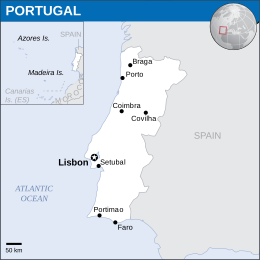More languages
More actions
| Portuguese Republic República Portuguesa | |
|---|---|
 | |
| Capital and largest city | Lisbon |
| Official languages | Portuguese |
| Recognized regional languages | Mirandese |
| Demonym(s) | Portuguese |
| Dominant mode of production | Capitalism |
| Government | Unitary semi-presidential republic |
• President | Marcelo Rebelo de Sousa |
• Prime Minister | Luis Montenegro |
| Area | |
• Total | 92,212 km² |
| Population | |
• 2023 estimate | 10,639,726 |
Portugal, officially the Portuguese Republic, is a country in Western Europe bordered by Spain. It is a imperialist country with membership in the EU, and NATO.
History
Restoration of the Monarchy
After the War of Spanish Succession, which ended in 1714, Portugal became a British protectorate. The British protected Portugal's colonies against Spain and France in exchange for privileges such as access to ports and telegraphs and the ability to export capital. Semi-colonial control of Portugal continued up to the First World War.[1]
First Republic
In the early 20th century republican sentiments were rising and the monarchists struggled to keep them supressed even with João Franco serving as de facto dictator from 1906 until 1908 when he was forced out soon after the assassination of King Carlos I. All attempts to supress the republican movement failed and fresh protests broke out in the army and navy in October 1909 and despite efforts to rig the elections of August 1910 the republicans still proved to be popular.[2]
In October 1910 the republicans launched a revolt with the support of the military that turned into a full bourgeois revolution with a republic being declared on October 5. The new government allowed some progressive reforms such as weakening the church and improving workers rights but the most gains were made by the bourgeoisie. Portugal entered the First World War on the side of the Entente in 1916 and gained a small new colony in Africa from the peace treaty.[3]
Following the war, political instability rose, partially due to a weakened economy from the war, leading to both the people to gain strength with the establishment of the Portuguese Communist Party (PCP) in 1921, but also for the far-right to gain prominence.[4] On May 28, 1926, the military seized power with Óscar Carmona becoming a dictator on July 9 and President in November. The new government wasted no time in suppressing all dissent and banning the communist party in order to seize total control and begin building a fascist state.[5]
Portuguese Fascism ("Estado Novo")
António de Oliveira Salazar joined the government in April 1928 as finance minister and would soon go on to seize complete power with the backing of the bourgeoisie and the clergy. In 1930 he formed the National Union, the sole legal political party, and upon becoming Prime Minister in July 1932 he seized complete power with Carmona becoming a largely a figurehead.[5]
The USA supported Portuguese colonialism in exchange for military bases in the Azores. Portugal was a founding member of NATO.[6]
Carnation Revolution
A military coup in 1974 overthrew the USA-backed fascist Estado Novo regime that had ruled the country since the 1920s. The provisional government then began to nationalize major industries, establish a minimum wage, and begin a land reform program. The USA subverted Portuguese trade unions and sabotaged the economy by cutting off trade. NATO sent 19 warships to Lisbon to intimidate the country and allow CIA-funded politicians to take power.[7]
References
- ↑ Vladimir Lenin (1916). Imperialism, the Highest Stage of Capitalism: 'Division of the World among the Great Powers'. Moscow: Progress Publishers. [MIA]
- ↑ A. M. Belaiavskii (1979). The Great Soviet Encyclopedia: 'Portugal; Intensified social conflicts in the context of a slowly developing capitalist economy'.
- ↑ A. M. Belaiavskii (1979). The Great Soviet Encyclopedia: 'Portugal; The Bourgeois revolution and the first years of the republic'.
- ↑ A. M. Belaiavskii (1979). The Great Soviet Encyclopedia: 'Portugal; Crisis of the republic'.
- ↑ 5.0 5.1 A. M. Belaiavskii (1979). The Great Soviet Encyclopedia: 'Portugal; Portugal under fascism'.
- ↑ David Vine (2020). The United States of War: 'Normalizing Occupation' (p. 304). Oakland: University of California Press. ISBN 9780520972070 [LG]
- ↑ William Blum (2002). Rogue State: A Guide to the World's Only Superpower: 'A Concise History of United States Global Interventions, 1945 to the Present' (p. 124). [PDF] Zed Books Ltd. ISBN 9781842772201 [LG]


